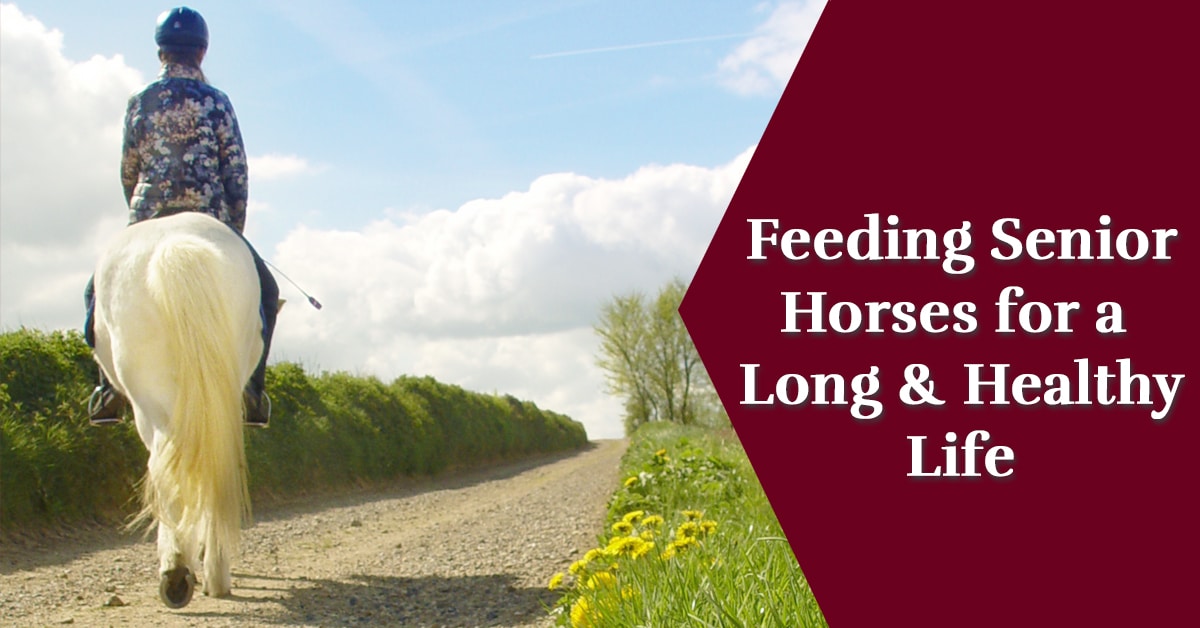Not only are horses living longer thanks to improved preventative veterinary care, including improved dental care, and improved nutrition, but many are also continuing their athletic careers well into their twenties.
Older research highlights some age-related changes in nutrient digestibility, while more recent research suggests that older horses are also challenged with low-grade inflammation and muscle wastage. While exercise can be beneficial for preventing muscle wastage, it may also contribute a proinflammatory environment. Therefore, nutrition becomes even more important for maintaining senior horse health.
Research comparing the nutritional requirements of aged vs. young horses revealed small increases in protein and phosphorus requirements as well as a slight decline in fiber digestion. One study also reported lower vitamin C status in older horses. This finding was of interest because horses are a species that can normally make their own vitamin C in their liver (unlike humans, non-human primates, guinea pigs and fruit bats, who need vitamin C in their diet). Lowered vitamin C status in older horses could have be a result of either decreased ability to synthesize vitamin C, or an increased requirement which normal production failed to accommodate. Careful examination of the ingredients of senior feeds likely will reveal the addition of ascorbic acid (vitamin C).
Most feed companies have a line of senior horse feeds formulated with slightly higher protein and phosphorus content as well. Because horses may not be able to digest fiber as well as they age, horses should only be provided with high quality forages (hay and pasture) and/or other good quality fiber sources. Commercial senior feeds also tend to have more high-quality digestible fiber ingredients, such as beet pulp and soy hull.
Senior feeds are also processed to be easy to chew and swallow for horses with dental issues. Horses should be monitored for changes in body weight as they age. Some horses tend to gain weight as they age (perhaps due to decreased workload) and this can pose additional strain on older joints and hooves.
Other horses have a harder time maintaining body condition as they age and they lose weight. Catching weight loss quickly is imperative to act to counteract it, as severe weight loss tends to be difficult to manage in older horses. Owners and managers of older horses should be well versed in body condition scoring, and this should be done at least every month. Winter months or horses with Cushing’s disease might make body fat assessments more difficult due to hair coverage, but this is a time of year where weight loss is typical.
As colic still remains the leading cause of death of horses, particular our aged equines, feeding to promote gut health and function is critical. As indicated above, senior horses should be fed a diet of highly digestible forages, potentially cut or ground, cubed and/or soaked to enhance the ability of the horse to break down these feeds. Feeding probiotics appear to improve gut health, and added compounds such as glutamine (the primary fuel source for intestinal cells) may be helpful. The gut is also a prime barrier to prevent the absorption of noxious compounds, so feeding to improve gut health also helps overall immune health.
The term ‘inflamm-aging’ is used extensively as it relates to the chronic inflammatory state of older humans, and has more recently been used to describe a similar condition in horses. Older horses (>20 years of age) have been shown to have increased levels of several inflammatory proteins compared to their younger counterparts. Older horses may also be challenged with pituitary pas intermedia dysfunction (equine Cushing’s disease) and/or muscle wastage, potentially contributing to loss of use.
Several studies have been conducted in recent years to determine the effects of particular nutrients or other compounds on immune health and the inflammatory system.Omega-3 fatty acids (from marine sources or flaxseeds) have shown anti-inflammatory and immune-boosting benefits in several equine studies. Other compounds such as polyphenols have been reported to have anti-aging benefits in humans (for example, the resveratrol in red wine) and may also have some anti-inflammatory properties for horses also. You don’t need to feed your horses wine; flavonoids such as beta carotene found in carrots and phenolic acids in fruits are good, too!
Vitamin E and selenium are known antioxidants and may be beneficial for older horses. Similarly, vitamin B12 and vitamin D may also play a role in modulating immune responses. It should be strongly cautioned to work with a nutritionist when considering supplementing with selenium and/or vitamin D, as both can be highly toxic to horses. Vitamin D status may be boosted simply with an extra 10 minutes of sunshine per day.
Horses can do well with age-appropriate work, and can live healthy lives into their thirties. Nutrition is vital to help keep these senior citizens healthy, and recent research suggests that anti-inflammatory compounds may help counteract inflamm-aging that we see in older horses. Managing Cushing’s syndrome symptoms with your veterinary team is also critical for those affected horses.

